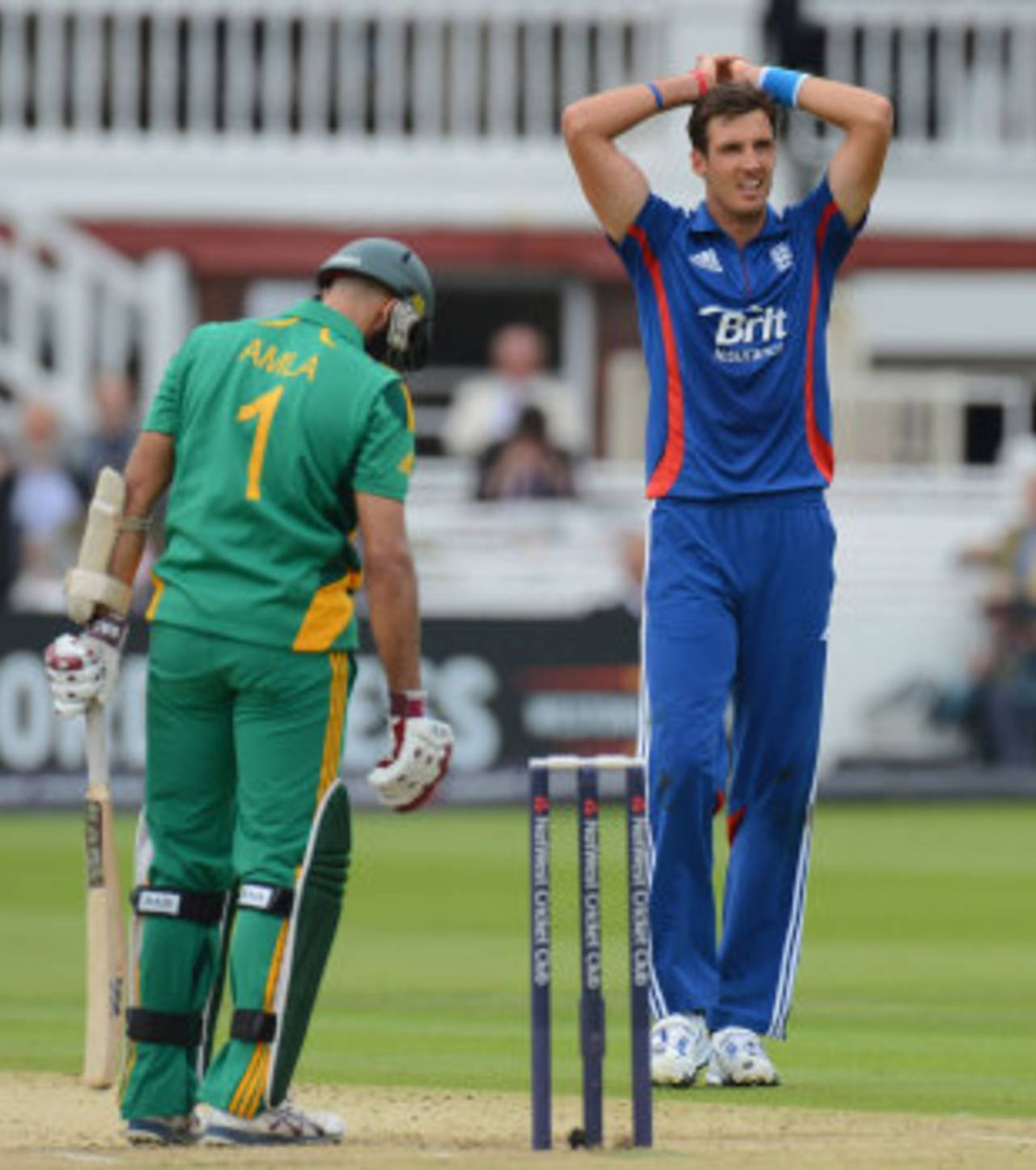This theme will sound a bit like a broken record, but England's catching malaise shows little sign of abating. At Lord's the focus was back on the slips, a problem area all summer, and the fact England secured
victory to take an unassailable 2-1 lead was despite, not because of, their fielding.
If that feels like a downbeat note on which to reflect on another solid victory - which is a sign of the strength of character in this one-day side - it never hurts to look at how a team can improve after a win. One thing is for sure, Andy Flower will not be rubbing out the dropped catches from his notebook that gets studiously filled during each match.
It is difficult to pinpoint when England last went through such a sustained period of weakness in the catching department. The Ashes tour in 1994-95 springs to mind, which came to a head when ten chances were put down in Perth, leading to Graham Thorpe booting the ball away at first slip after he grassed one. In 2006 England suffered a bad Test at Lord's against Sri Lanka when a hatful of chances went down and the visitors saved the game, but by the next match standards had improved. While there are obviously other failures in between, too, the current issues have become a trend.
This season, at least since the third Test against West Indies when Ian Bell dropped two at slip, there has been a consistency about the inconsistency. And it is not just one player, either, unlike previous occasions when the likes of Kevin Pietersen or Matt Prior have gone through periods of missing plenty. James Anderson,
Alastair Cook and Andrew Strauss missed them in the Test series, while
Craig Kieswetter had an awful ODI in Southampton and at Lord's it was James Tredwell's turn to let two escape his grasp.
The first, inevitably off Hashim Amla's outside edge, flew at an awkward shoulder-height to Tredwell at second slip and he could not decide whether to go with his hands up or down. Still, it should have been swallowed. The second came when Tredwell was stood at a lone first slip and Graeme Smith edged the same bowler, Steven Finn. Kieswetter committed to the dive and his out-stretched left glove distracted Tredwell, who never got near catching it. It was credit to Tredwell that did not let the misses affect his bowling, where he responded with a beautifully controlled 3 for 35.
However, the fact that Tredwell and Jonathan Trott were England's two slips highlights the issues they are having. It is not that they are poor slippers - it bemuses many that Trott is not there more often and Tredwell does it for Kent - but there has been a huge amount of chopping and changing in recent months. That is unavoidable to a degree - players retire, others get injured, while Test and ODI teams are not the same - but like any role in sport players have to be able to settle in a position.
Cook, who has fielded slip in Tests albeit with mixed results, and Anderson are not there to quick bowlers in ODIs (although Anderson stood there to the spinners at Lord's). Fielding in the slips, while a very individual skill, also requires a sixth sense built up over time over who will go for what, especially between the keeper and first slip. Healy-Taylor, Gilchrist-Warne, Strauss-Prior (mostly) and Smith-Boucher are just a few contemporary examples of long-term associations.
In ODIs, Cook likes to field at mid-off to chat to his bowlers but first slip is ideal for a captain. Can he make himself safe in that position? It might also help him judge the use of DRS"
In terms of England's catching as a whole they have not replaced Paul Collingwood, who spent his career at backward point in ODIs and third slip in Tests, or second when the likes of Andrew Flintoff or Graeme Swann were bowling. It was a natural stagger, everyone knew where they would be.
Crucially, too, the first slip remained almost constant, certainly in Tests, whether it be Marcus Trescothick (who had to avoid Geraint Jones' keenness to dive more than once) or Strauss. Now that will come into focus again in the Tests with Strauss departing with a record number of England catches. In ODIs, Cook likes to field at mid-off to chat to his bowlers but first slip is ideal for a captain. Can Cook make himself safe in that position? It might also help him judge the use of DRS; as in the second match at West End, where they wasted one on JP Duminy, here there was a silly review against Amla, who was then given not out to one that was taking leg stump.
However, amid another reminder of how England's fielding has lost its edge it should be mentioned how well Kieswetter responded under pressure, making five dismissals. It was a tough game for him in Southampton and he played a hand in Smith's reprieve here, but soon set about evening the ledger. He held a sharp catch above his head off Smith's top edge then became the first England wicketkeeper to complete three stumpings in an ODI.
Two were comfortable but he was quick to spot AB de Villiers' toe on the line, although he blotted his copy book when he chased a shot from Robin Peterson and produced a poor throw to Anderson at the stumps. It was not a wicketkeeping error, but just another little moment to add to a lengthy list from the team season. Peterson later showed that South Africa are far from infallible when he dropped Bell at mid-on to put a seal on a disappointing show from the visitors who, this time, could not make England pay for their mistakes. But that does not mean the problems can be ignored.
Andrew McGlashan is an assistant editor at ESPNcricinfo
